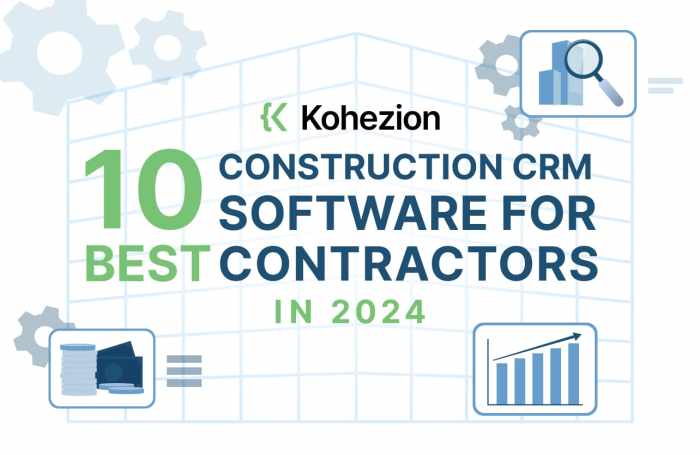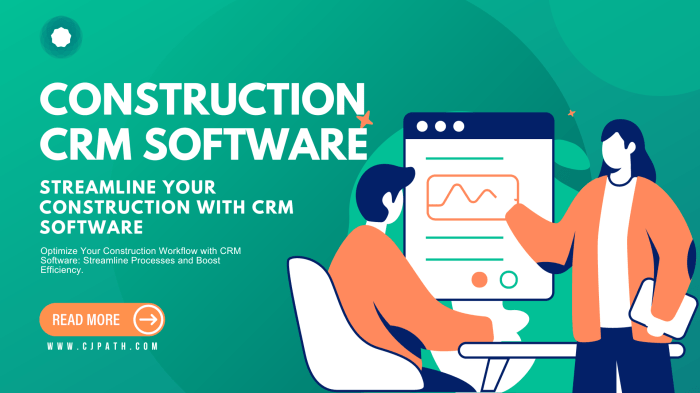Crm software for construction companies – The construction industry is dynamic, demanding, and intensely competitive. Managing projects, clients, and teams effectively is crucial for success. This is where Customer Relationship Management (CRM) software steps in, offering a powerful solution to streamline operations and boost profitability. This comprehensive guide explores the benefits, features, and selection process for choosing the right CRM for your construction company, covering everything from lead management to project tracking and beyond.

Source: kohezion.com
Why Construction Companies Need CRM Software
Construction projects are complex, involving numerous stakeholders, intricate timelines, and significant financial investments. Traditional methods of managing client relationships and project details often prove inefficient and prone to errors. A dedicated CRM system offers a centralized platform to manage all aspects of your business, leading to:
- Improved Client Communication: Centralized communication channels ensure timely updates and clear communication with clients, subcontractors, and architects, minimizing misunderstandings and delays.
- Enhanced Project Management: Track project milestones, deadlines, budgets, and resource allocation effectively, improving project visibility and control.
- Increased Efficiency and Productivity: Automate repetitive tasks such as lead nurturing, proposal generation, and reporting, freeing up valuable time for strategic initiatives.
- Better Lead Management: Capture and nurture leads more effectively, converting them into paying clients with targeted marketing and personalized communication.
- Stronger Client Relationships: Build lasting relationships with clients by providing exceptional service and demonstrating a commitment to their success.
- Improved Reporting and Analytics: Gain valuable insights into your business performance through comprehensive reports and dashboards, enabling data-driven decision-making.
- Reduced Administrative Overhead: Streamline administrative processes, reducing paperwork and improving overall efficiency.
Key Features of a Construction CRM: Crm Software For Construction Companies
While many CRM platforms exist, those designed specifically for the construction industry offer features tailored to its unique needs. Look for these essential functionalities:

Source: cjpath.com
Project Management Capabilities, Crm software for construction companies
- Task Management: Assign and track tasks, monitor progress, and identify potential delays.
- Document Management: Securely store and share project documents, blueprints, and contracts.
- Timeline Management: Visualize project timelines, identify critical paths, and manage deadlines effectively.
- Budget Tracking: Monitor project budgets, track expenses, and identify potential cost overruns.
- Resource Allocation: Assign and manage resources (equipment, personnel) efficiently.
Client Relationship Management Features
- Contact Management: Maintain a centralized database of client information, including contact details, project history, and communication logs.
- Lead Management: Capture and qualify leads, nurture them through the sales funnel, and convert them into clients.
- Communication Tools: Integrate email, phone, and messaging capabilities for seamless communication.
- Customer Service Management: Track and manage customer service requests, ensuring prompt resolution of issues.
Reporting and Analytics
- Customizable Dashboards: Monitor key performance indicators (KPIs) and gain real-time insights into your business performance.
- Financial Reporting: Generate reports on project profitability, revenue, and expenses.
- Sales Reporting: Track sales performance, identify top-performing sales representatives, and analyze sales trends.
Integration Capabilities
A robust CRM should integrate seamlessly with other essential business tools, such as:
- Accounting Software: Integrate with accounting software for automated financial reporting.
- Project Management Software: Integrate with project management software for seamless project tracking.
- Bidding Software: Streamline the bidding process by integrating with bidding software.
- Estimating Software: Improve accuracy and efficiency in estimating projects.
Choosing the Right CRM for Your Construction Business
Selecting the right CRM involves careful consideration of your specific needs and budget. Factors to consider include:
- Company Size and Complexity: A small construction company may need a simpler CRM than a large enterprise.
- Budget: Consider the cost of the software, implementation, and ongoing maintenance.
- Features and Functionality: Ensure the CRM offers the features necessary to meet your business needs.
- Integration Capabilities: Choose a CRM that integrates with your existing business tools.
- Scalability: Select a CRM that can scale with your business as it grows.
- User-Friendliness: Ensure the CRM is easy to use and understand for all employees.
- Customer Support: Choose a vendor that provides excellent customer support and training.
Examples of CRM Software for Construction Companies
Several CRM platforms cater specifically to the construction industry’s needs. Research and compare options like:
- CoConstruct: Known for its project management capabilities and integration with other construction tools.
- Buildertrend: A comprehensive platform offering project management, client communication, and financial tools.
- ServiceTitan: A powerful solution for larger construction companies, offering advanced features and scalability.
- Salesforce: A highly customizable platform that can be adapted to meet the specific needs of any construction business (often requires significant customization).
- Zoho CRM: A more affordable option with a wide range of features, suitable for smaller businesses.
Remember to request demos and trials before committing to a particular platform to ensure it meets your requirements.
Frequently Asked Questions (FAQ)
- Q: How much does construction CRM software cost? A: Costs vary widely depending on the features, scalability, and vendor. Expect to pay anywhere from a few hundred dollars per month to several thousand for enterprise-level solutions.
- Q: How long does it take to implement a CRM? A: Implementation time depends on the complexity of the CRM and the size of your company. It can range from a few weeks to several months.
- Q: What are the benefits of using a cloud-based CRM? A: Cloud-based CRMs offer accessibility from anywhere with an internet connection, automatic updates, and reduced IT infrastructure costs.
- Q: Can a CRM improve my project profitability? A: Yes, by improving efficiency, reducing errors, and enhancing communication, a CRM can significantly improve project profitability.
- Q: What if my team isn’t tech-savvy? A: Many CRMs offer excellent training and support, and user-friendly interfaces are becoming increasingly common. Choose a system with intuitive navigation and consider providing adequate training to your team.
Conclusion
Implementing a CRM system is a strategic investment that can significantly enhance the efficiency, profitability, and overall success of your construction company. By carefully evaluating your needs and selecting the right platform, you can unlock the power of data-driven decision-making, improve client relationships, and streamline operations to achieve your business goals.
References
Call to Action
Ready to transform your construction business? Contact us today for a free consultation and let us help you find the perfect CRM solution to streamline your operations and boost your bottom line!
Question & Answer Hub
What are the key features to look for in construction CRM software?
Key features include project management capabilities, contact management, lead tracking, document storage, reporting and analytics, and ideally, mobile accessibility.
How much does construction CRM software typically cost?
Pricing varies greatly depending on the features, number of users, and vendor. Expect monthly subscription fees ranging from basic plans to more comprehensive enterprise solutions.

Source: psdcenter.com
Can CRM software integrate with other construction-specific software?
Many CRM systems offer integrations with accounting software, project management tools, and other industry-specific applications to create a unified workflow.
How long does it typically take to implement CRM software?
Implementation timelines depend on the complexity of the system and the company’s size. Expect a period ranging from several weeks to several months for complete setup and training.
